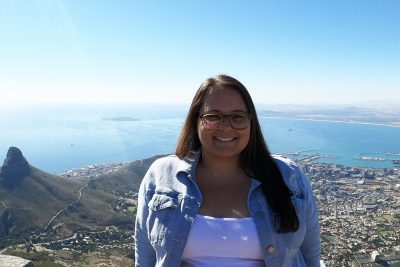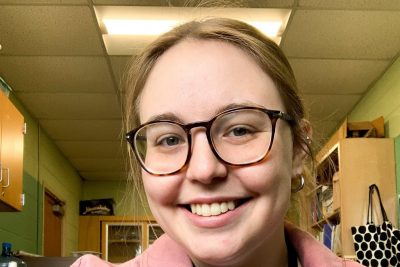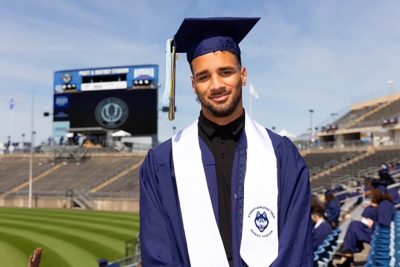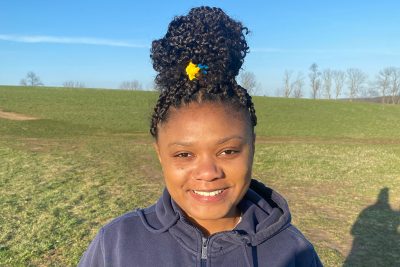Neag School of Education
2022 Commencement Speakers and Honorary Degree Recipients
Speakers from a broad range of fields and backgrounds will share their wisdom with UConn's Class of 2022
April 29, 2022 | Tom Breen
Class of 2022 Student Profile: Anamaria Sousa
I chose UConn because of the IB/M program that the Neag School offers. I obtained my bachelor’s degree in four years and my master’s degree in one. Basketball is also my favorite sport, and what better than to go to school in the basketball capital of the world," says graduating master's student Anamaria Sousa '20 (ED), '22 MA.
April 28, 2022 | Shawn Kornegay
Class of 2022 Student Profile: Kaitlyn McGuire
"I knew that the Neag School of Education had a nationally recognized teacher prep program. Additionally, the special education program is filled with top faculty in their fields of research, and I was so excited to learn from their expertise. Not only did I attend for the academics, but I knew that in Storrs, I could be free to challenge myself through my extracurriculars," says graduating master's student Kaitlyn McGuire '20 (ED), '22 MA.
April 28, 2022 | Shawn Kornegay
Class of 2022 Student Profile: Madison Levine
"I chose UConn because I wanted to go to a big school with many opportunities and groups of people. Also, knowing that I was going into education, UConn was the perfect fit with an integrated bachelor's and master’s program," says graduating master's student Madison Levine '20 (ED), '22 MA.
April 27, 2022 | Shawn Kornegay
Class of 2022 Senior Profile: Lucas Knight-Vezina
"UConn was my first-choice college because of its school of education. I was very impressed by the Neag School of Education and thought it would be the perfect fit as I pursued a degree in secondary English education. I grew up in Tolland, Connecticut, so I was also fortunate enough that I was 20 minutes away from my hometown, giving me enough independence but the convenience of a quick drive home when I needed a home-cooked meal," says graduating senior Lucas Knight-Vezina '22 (ED), '23 MA.
April 27, 2022 | Shawn Kornegay
Class of 2022 Student Profile: Tyler Gleen
"I chose to come to UConn because it offered academics and extracurriculars that fit my needs to be successful. In high school, I was lucky enough to have had the opportunity to run track at a competitive level and to be able to continue that into college. However, I also knew that I wanted to become a teacher, and so I wanted to attend a university that supported both ambitions. UConn had a competitive track team and had one of the top education programs around. I also didn’t want to be too far from my hometown," says graduating master's student Tyler Gleen '21 (ED), '22 MA.
April 26, 2022 | Shawn Kornegay
Class of 2022 Senior Profile: Larrese Folk
"I came to UConn because it was the best financial decision. I knew I didn’t want my mom paying for my education. So, with the scholarships I earned and the money I was receiving, I decided to come here," says graduating senior Larrese Folk '22 (ED).
April 26, 2022 | Shawn Kornegay
Class of 2022 Senior Profile: Zene Charlton
"I chose UConn because it is almost a no-brainer to apply due to being someone who’s lived in Connecticut for a large chunk of my life, but it is also synonymous with producing great teachers through the Neag School of Education," says graduating senior Zene Charlton '22 (ED).
April 25, 2022 | Shawn Kornegay
Class of 2022 Senior Profile: Bryan Carrera
"I came to UConn because I’ve heard so many great things about UConn. My high school Band teacher went to UConn and spoke great things about it. When I came up to visit and shadow a student, I saw the countless possibilities and opportunities right before me and thought I could thrive the best here compared to other schools," says graduating senior Bryan Carrera '22 (ED).
April 25, 2022 | Shawn Kornegay
Class of 2022 Student Profile: Jonathan Dos Santos
"I chose UConn as my school due to the numerous opportunities that the school provided me. After my first time stepping foot on campus, I knew that this was the place for me and that I would successful here. Another reason why I went here was to be with my family. My sister also went to UConn, and she only spoke great things about the school, which influenced me in becoming a Husky," says graduating master's student Jonathan Dos Santos ’20 (ED), ’22 MA.
April 25, 2022 | Shawn Kornegay









